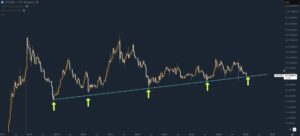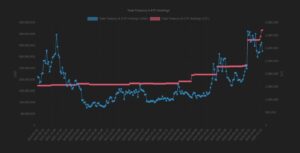The world’s third biggest wealth management firm with over $4.2 trillion in assets under management launched a spot Bitcoin exchange-traded fund (ETF) on the Toronto Stock Exchange this month. Spot Bitcoin trading is now live.
In Brief
- Fidelity launched a physical spot Bitcoin ETF in Canada under the ticker FBTC.
- The launch comes months after the firm met with SEC officials to seek approval for a similar US-based product.
- The SEC has outright rejected all spot crypto ETF applications so far, risking capital flight to more welcoming jurisdictions.
Fidelity Launches Spot Bitcoin ETF in Canada
Fidelity’s physical spot Bitcoin ETF officially started trading on the Toronto Stock Exchange on Thursday December 2nd.
With over $4.2 trillion in AUM, the firm is the largest asset manager to launch a spot-based Bitcoin exchange-traded fund (ETF). For all intents and purposes, a physically backed spot-based ETF is less risky than a futures ETF. The Fidelity Advantage Bitcoin ETF is trading under the ticker FBTC, and is designed to invest in “physical” or spot bitcoin i.e. – the underlying is actually bought (not a derivative).
Cryptocurrencies aren’t going away. Buy Bitcoin here.
The launch comes a few months after Fidelity officials met with the US Securities and Exchange Commission (SEC)for approval of a similar product in the United States. So far, the SEC either hasn’t approved or has outright rejected spot crypto ETFs, arguing that these products don’t comply with mutual funds rules.
Are US Regulators Breaking The Law?
In the US, the SEC is funneling investors into a futures ETF, potentially putting them at increased risk. Here are four reasons to avoid the Bitcoin futures ETF. The SEC’s decision making has come under scrutiny from various asset managers like Grayscale, which argued in a letter that the SEC is breaking the law by rejecting SPOT-based Bitcoin ETFs.
Last night our attorneys at Davis Polk sent a letter to the SEC arguing that approval of #Bitcoin futures-based ETFs, but not #Bitcoin spot-based ETFs, like $GBTC, is “arbitrary and capricious,” and therefore in violation of the Administrative Procedure Act (APA).
— Craig Salm (@CraigSalm) November 30, 2021
“The Commission has no basis for the position that investing in the derivatives market for an asset is acceptable for investors while investing in the asset itself is not,” read the letter.
Meanwhile, Canada has embraced spot crypto ETFs, which have attracted billions in investments recently. While the SEC has sidelined Americans, Canadian investors are able to get direct exposure to Bitcoin (via traditional finance) by purchasing shares of the Fidelity Advantage Bitcoin ETF (FBTC) with Canadian and US Dollars.
By doing so, the SEC risks an uptick in capital flight from the United States to Canada and more favourable jurisdictions.
Join the telegram channel for updates, charts, ideas and deals.
Did you like the article? Share it!


